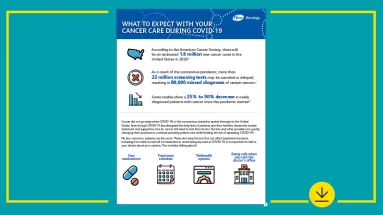

A free app designed to help manage life with cancer.
Use Requests to ask loved ones for help with
daily tasks like meals or rides to doctors' appointments.
You can also find events in your area.
Download LivingWith® for free or
learn more about the app.
Latest articles
View By:Get support
View By:Even though COVID-19 has disrupted the daily lives of patients and their families, those who receive treatment and supportive care for cancer still need to visit their doctor.







